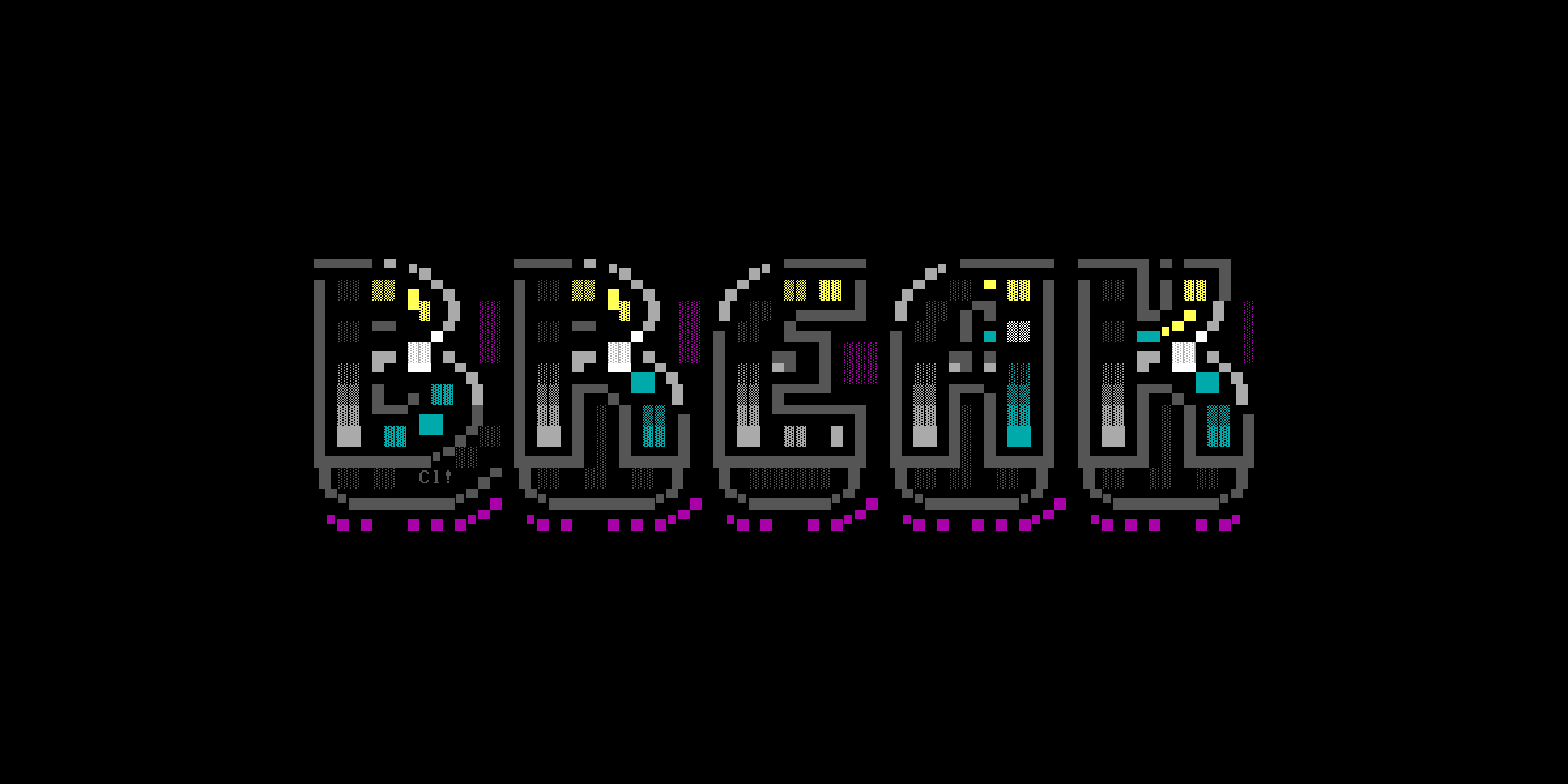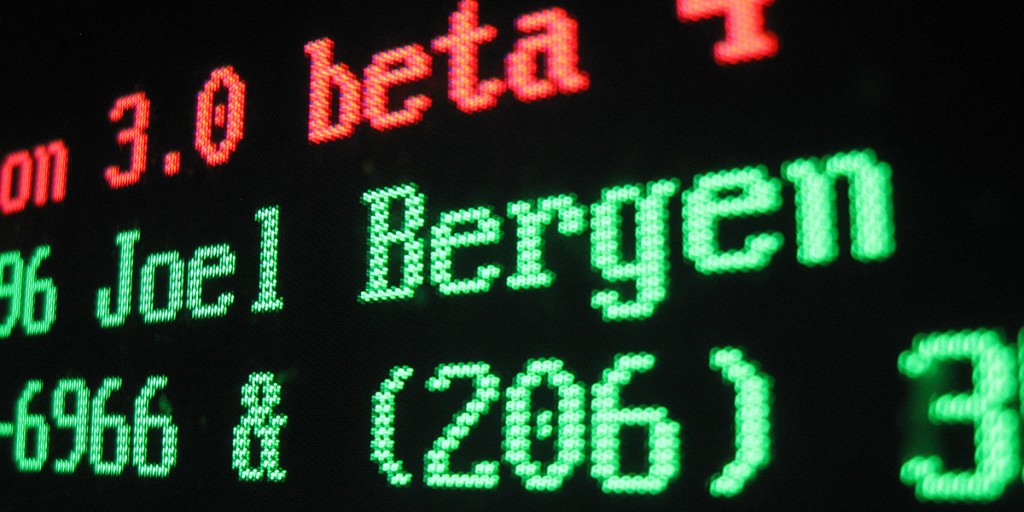Joel Bergen learned to program using paper tape in high school, and he’s been fascinated by computers ever since. In 1989, Bergen began adapting popular tabletop games to create his BBS door games Global War and Global Backgammon — all while pursuing a career as a designer at Boeing.
I played Global War as a kid, and years later realized that in doing so I had also learned to play Risk. This interview was conducted by email Feb. 10 through Mar. 18, 2013.
Do you enjoy my retrocomputing interviews on Break Into Chat? Please join my email list and stay in touch. 📬
Josh: How did you get into programming?
Joel: My first exposure to computers was as a Junior at Duluth Central High School in 1976. I enrolled in a computer programming class the first year it had ever been offered at our school. Our school had one “computer” which was actually a teletype machine. Our teletype machine was not a computer in the modern sense. It didn’t have a screen or monitor. It printed everything on long rolls of paper. It didn’t have a CPU or memory or disk drive. It connected to a mainframe using a 110 baud (12 characters per second) modem — an antique style modem with an acoustic coupler where you’d pick up a phone, dial a number, wait for a tone, and stuff the phone handset into the modem. For storage, it used punched paper tape. You could save your program on a roll of paper tape a couple inches wide. The machine would punch rows of holes in the tape that would represent the data. You could take the roll of paper with you, and re-feed it back into the terminal later to re-load your program. The entire class shared this one terminal, which we used to do our programming exercises and homework in BASIC. A few of us were utterly fascinated by the technology, none more so than me. I would stay after school, sometimes until midnight, writing programs and experimenting with writing games. I wrote a craps game which quickly caught on with my fellow students. Eventually, several students got in trouble for being late to their classes and after the teachers discovered it was because they were “shooting craps in the computer room”, they made me delete the program.
A year after I graduated in 1977, Radio Shack introduced the TRS-80 home computer. I bought one of the first ones released, which cost $599, which was a considerable sum of money at that time. It had 4K (that’s 4,096 bytes) of memory, no graphics, no color, and no disk drive. It used an unreliable casette tape recorder for storage. But I was in heaven. Later, I added the expansion interface and 180K floppy drives.
What led you into BBSing?
One of my favorite magazines was Computer Shopper, which published a list of BBSes and their phone numbers. After reading about them, I bought my first modem, which had advanced to a whopping 300 baud by then (about 37 characters per second!). The first BBS I called was the West Coast Message System, run by Art Fessenden. It featured a message board, some articles, and a collection of recipes. I met Art in person and saw his setup once. It consisted of a TRS-80 Model I, expansion interface, and eight floppy drives (at 180K each, giving it as much storage as a modern day 3.5″ floppy).

Which came first — becoming sysop of your own BBS, or writing a BBS game?
During the early 1980s, the home computer industry exploded. I sold my TRS-80 and built my first 80286 PC. I enjoyed computer programming as a hobby so much that I started programming in different languages, eventually selecting Borland Turbo Pascal as my favorite. During the mid 1980s, BBSes were starting to become more and more popular. I enjoyed BBSing as much as anyone else, but it was WWIV BBS, which was written in Turbo Pascal and came with source code, that drove me into setting up my own BBS and becoming a sysop. I decided to run a BBS not for the social networking aspect of it, but rather the technical aspect of being able to tinker with the software source code.
One of Turbo Pascal’s strong features was it’s ability to “chain” or overlay sub-programs into memory without having to add the source code of the sub-program to the BBS and recompile. These “chains,” later called doors eventually became very popular. There were not very many chains available for WWIV at that time. It was then that I decided to develop one for my BBS. After some consideration, I eventually decided to adapt the popular board game Risk.
Adapting Risk as a BBS door required only a few modifications. Unlike the board game, where players take their turns sequentially, BBS callers could call in any order, at any time of the day or night. Forcing up to 6 players to take turns in sequential order just didn’t seem like it would work out right, so instead each player was allowed one turn per day, in any order. This worked out well, except savvy players would sometimes call just before midnight, take a turn, then call again right after midnight to take another turn, often winning the game by taking two consecutive turns. Later I added sequential turn orders as an option, with the condition that if a player did not take his turn in 24 hours, he forfeited his turn. Another added feature was the “Hall of Fame,” whereby winners would advance in rank each time they won a game.
At the time that Global War was released, most callers were using 2400 baud modems, but some players were still using 300 baud. Drawing the maps at 300 baud was painfully slow, so I came up with the idea of GWTerm. GWTerm was a terminal program that the caller could use when playing Global War. All of the maps were stored in a file on the caller’s computer. Whenever the caller would choose to display a different map, Global War would send a two-byte code to GWTerm, which would pull the appropriate map out of a data file and instantly draw it on their local screen in a split second. It was a big hit with the 300 baud crowd, and even 2400 baud modem users liked it. Later, I added mouse support which enabled the caller to play Global War entirely using a mouse. With that, even the 9600 baud users liked using GWTerm.
I adapted Global War to work with other BBS programs besides WWIV and its popularity grew until it eventually became one of the most popular BBS door games. It was followed by a backgammon door called “Global Backgammon” with the same look and feel. I had plans to write additional door games like Global Chess, Global Checkers, a version of Global War with wars on multiple planets, but alas the Internet came along and brought with it the end of BBSes.
I feel very fortunate to have been a part of the golden age of the BBS. It is a special time of my life that I will always cherish.
Did you interact much with the sysops and users who played your games?
Oh, sure. Lots of interaction with players and Sysops, via e-mail. Many of the great ideas came from players, like player-to-player messages, team games, hidden names and such. The nice ANSI maps in GWTerm were done by a player with much more graphics talent that I had.
There is a long history of online adaptations of classic games, from checkers to “Words with Friends.” There have also been lawsuits along the way, as when Hasbro sued the makers of Scrabulous. Did you ever worry someone might come after “Global War?”
I was very concerned about copyright when I was developing Global War, and took the issue very seriously. The reason the door is not called “Risk” was to prevent infringing on Parker Brothers’s trademark. When the door was completed, I wrote a letter to Parker Brothers describing Global War, explaining that it was a BBS door game, what a door was, what the differences were between GW and “Risk”, and asked them to review the door and let me know if they had any objections. They wrote me back and said they had no interest in the door game and wished me luck with publishing the game. Parker Brothers was a pleasure to do business with. I suspect the authors of the other games you mentioned could have avoided a lot of trouble had they simply written the companies seeking their permission beforehand just as I did.
What was your relationship like with other door game authors? Was there camaraderie, or was it more tense given that you were competing for sysops’ dollars?
It’s difficult to forge close relationships with people when all you have is e-mail, but simply exchanging e-mails with other door authors and sysops was always a joy. It was a camaraderie for sure. There was never any competition for dollars, at least not for me. I have no idea to this day how much other authors earned. The only competition was over who could write the most exciting game.
What sort of work were you doing when you created Global War? Was it tricky finding time to develop the game?
I was a designer for Boeing around that timeframe and I still am. I was designing the structure that supports the floors and the fuselage frames on the 767 back then. I’m still a designer for Boeing except I’m a fuel systems designer on the 747 now. Working on Global War was a hobby that I enjoyed very much and looked forward to working on every day when I got home. I found it very relaxing and fulfilling.
Did programming figure into your career at any point?
Although the thought crossed my mind on several occasions, I decided not to pursue a career in programming for several reasons. I already had a good paying job and a secure career in an industry that I enjoyed working in. Writing games and programming was a hobby that I also enjoyed and wanted to keep it that way. Some things are enjoyable as a hobby, but not so enjoyable as a profession. Working on cars is a good example. Some of my friends love tinkering on their cars, restoring antique cars or making hot-rods in their garage, but the last thing they’d ever want to do is be a mechanic and fix other people’s cars. It was the same way for me. I had the freedom to choose what I wanted to work on, when and how much to work on it, to express my creativity, and to program in Pascal (which I really liked) instead of C (which I didn’t).
How many shareware licenses did you sell over the years you supported your games?
I sold around 3,500 shareware licenses for Global War, and something like 450 for Global Backgammon as I recall. There wasn’t much money to be made in door games, since the only customers were sysops, but any hobby that pays for itself is a hobby worth having in my view.
Why did you end up selling your games to John Dailey? Was that a hard decision for you to make?
BBSes were in decline around the time that John contacted me. I was still working on Global War. I was [adding] “network games” to Global War at the time. This was to be a new game type where players in one city could play against players in another city. After a player took his turn, the game would be sent via e-mail to another BBS somewhere else where players there would take their turn and the game would be forwarded on again. The feature was in the testing phase, but the sysops I was working with were closing down their BBSes one by one as the internet gradually took over. Shareware sales were down to only a couple per month. It was getting discouraging by then and I was considering closing up myself right around the time John contacted me. John was contacting the authors of many door games, offering to buy them. The timing worked out perfect for me and it was an easy decision to make. I hoped that John would continue to improve and make all of the door games playable through the internet but unfortunately that never happened. Maybe it will someday. That would be awesome.
Your door game days are done, but is programming part of your life in any other ways today?
Not really. Programming today seems far more complicated than it was back in the good old days. I may revisit it someday. Multi-player games on cell phones are much the same as door games, and board games like Risk are already available.
I was amazed by the photos on your Navigator blog. How did you get into sailing?
I taught myself to sail in the early 80’s and have enjoyed it off and on ever since. Boatbuilding is the latest in a long series of hobbies that I’ve enjoyed ever since I was a kid, which include chess, model rocketry, model airplane building, R/C airplanes, helicopters and boats, computer programming, aquarium keeping, flyfishing, sailing and most recently, boatbuilding and dinghy cruising.
My introduction to Risk was playing Global War on BBSes. I’m only average, but I wonder about you. If we were to fire up the old modems and battle it out in Global War, should I fear you?
If we were to fire up GW, you should be afraid. You should be very, very afraid 🙂


Share your thoughts!